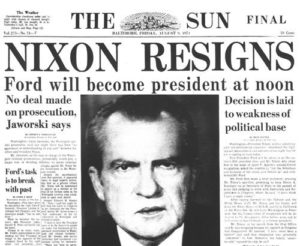1974
Richard Nixon resigns
It’s never the crime, it’s the cover-up. That’s the lesson imparted by the saga of Richard Nixon and the Watergate Hotel break-in, a tangled tale that led to the only resignation of an American President.
Nixon had a long career of public service. After serving in the Navy during World War II, he was elected as a congressman from California in 1946 and gained a reputation as a fervent anti-Communist. His part in the unmasking of former State department advisor Alger Hiss as a Communist agent won him national fame, vaulting him to a Senate victory, and then prompting Dwight Eisenhower to chose him as his vice-presidential running mate in the 1952 election. In 1960 he failed to beat John Kennedy in the presidential election and failed as well in 1962 an attempt to be California governor, afterwards telling reporters they wouldn’t have “Nixon to kick around anymore”. Nixon was able to take advantage of the disenchantment of voters with the Vietnam war and the Democrats, beating Hubert Humphrey in a 1968 presidential campaign. He was re-elected in 1972 but that’s when the wheels began to fall off the wagon.
The 1972 election was marked by a number of disgraceful political tricks and malpractice. Among these was an attempted break-in at the Democratic Party headquarters in Washington’s Watergate Hotel. The perpetrators were easily detected and reporters were able to link them to certain figures in the White House and Nixon’s re-election campaign. The question then was: did the President know about this shabby scheme? Nixon denied it, but to everyone’s astonishment it was revealed that conversations in the presidential mansion were routinely tape-recorded. As the nation watched, Nixon’s legal team fought against disclosing the tapes; Nixon sacked the Watergate Special Counsel. At last the Supreme Court ruled that the tapes had to be disclosed and a smoking gun was revealed — Nixon had known about the cover-up and deceived the nation. Rather than face impeachment, he resigned and returned to private life.
Historians are still uncertain about how to weigh Nixon’s legacy. He was certainly a productive president: he brought forth environmental protections, opened up to Red China, negotiated missile reduction with the USSR, pulled troops out of Vietnam and ended military conscription, but his secretive, driven personality and his perceived deviousness won him no friends.
